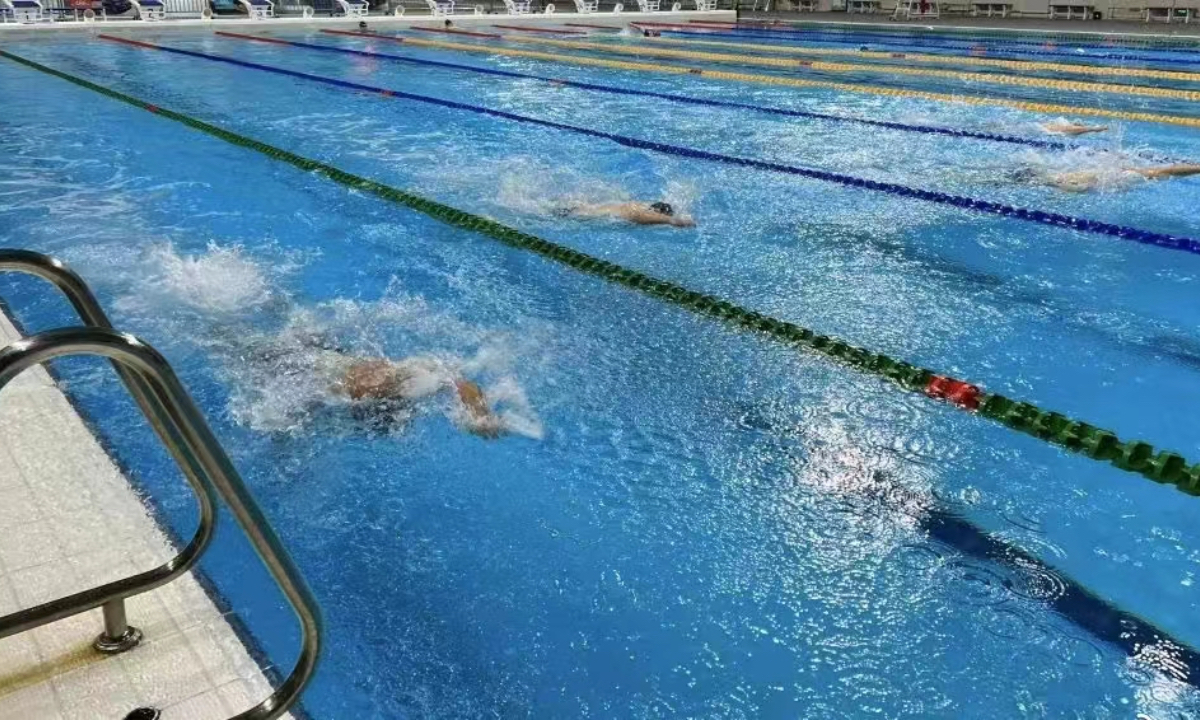
People are swimming at the sports center in Hohhot, North China North China's Inner Mongolia Autonomous Region. Photo: the Paper.cn
The opening of women-only lanes at a swimming pool in Hohhot, North China's Inner Mongolia Autonomous Region has sparked discussion on Chinese social media with divided opinions, but it is still seen by the public as a positive attempt to enhance the protection of women's rights and promote social equality.
A staff member of the swimming pool at Hohhot Sports Center told the Global Times on Thursday that the opening of women-only lanes will be a long-term measure, and the feedback so far has been very positive, with many female swimmers choosing to use the lanes.
The sports center set up two "women-only lanes" on Wednesday, while the remaining lanes can be shared by all swimmers. The center said its purpose was to protect female swimmers from differences in physical conditions and skills.
"Women are free to choose which lane to swim in, and men can also choose to swim in the 'women-only lanes' if there are no female swimmers," said the sports center, adding that male swimmers should leave the lane once a woman enters.
Sometimes female swimmers are kicked by men who swim faster than them, and others can be hesitant to go in the water when the pool is too crowded, the manager explained.
The Hohhot Sports Center issued a survey in February to solicit suggestions before launching the women-only lanes. More than 80 percent of respondents said they supported the women-only lanes, the center said.
"I support the women-only lane not only because it provides a more relaxed and comfortable environment for women, but also because I don't have to worry too much about affecting others who swim faster than me, especially some male swimmers," said a netizen on social media platform Sina Weibo.
Despite the support from the swimmers, the enforcement of the female-only space has opened up a series of debates on social media about gender equality from different perspectives.
This is not the first time a swimming pool in China has introduced a women-only lane. A similar measure was introduced at a swimming pool in Guangzhou, South China's Guangdong Province in 2018, which sparked discussion online at that time about the boundary between the protection of women's rights and discrimination and restrictions.
"Women don't need this kind of segregated protection, but the rights and freedom from being harassed in any space," one netizen argued, adding that being over protective is an act of discrimination.
Others said that the practice of the swimming pool is discriminating against men in the name of protecting women. If the purpose of establishing a special lane is to prevent sexual harassment by men, then it is also unfair to men who are subjected to an inference of guilt and immorality, they added.
Moreover, some people also cited media reports as saying that women accounted for 72.94 percent of the votes in the survey. Female swimmers voted for themselves in the majority, hoping for a quiet and safe swimming environment, making the results not entirely fair.
Chinese society is making efforts to improve women's equal rights and opportunities, especially in urban public venues such as sports centers, subways and shopping centers.
In addition to women-only subway cars and swimming lanes, which have been introduced in several cities across the country, women's toilets in shopping malls and other public places have more seats than men's.
Women's toilets designed to have more seats than men's is not a discrimination against men, but determined by different biological characteristics of both sides, media reports quoted Sheng Yitao, an associate professor in public administration at Renmin University, as saying.
https://news.sohu.com/20141205/n406672193.shtml
At the same time, experts also pointed out that the fight for the rights and interests of a certain gender should not be at the expense of the legitimate rights and interests of another group.

